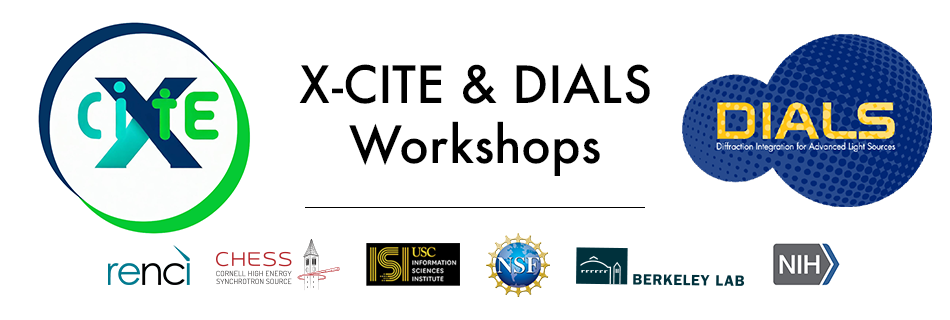This year, CHESS will offer two free workshops on Wednesday, June 4, 2025 with joint programming related to X-ray software and computing:
-
X-CITE: Cyberinfrastructure Training and Education for Synchrotron X-Ray Science. This workshop is intended for CHESS users with upcoming beamtime and data analysis needs.
-
DIALS: Diffraction Integration for Advanced Light Sources. This workshop is intended for researchers in X-ray crystallography and structural biology.
These workshops are open to in-person participants only; no virtual option is available. When registering, please select “X-CITE” or “DIALS” for the hands-on tutorial. The registration questions on Linux and Python are meant to assist us in planning these tutorials. Please bring a laptop for use in the hands-on tutorial.
We welcome participants of all levels of experience. For those with little or no familiarity with scientific computing, we will distribute pre-workshop introductory lessons on remote access, Linux, Python, and the CHESS research workflow about two weeks before the workshop (mid-May). We will also hold virtual office hours before June 4 to address any questions about these materials.
The program on June 4 will start with a combined morning plenary session for participants of both workshops, followed by an afternoon parallel session with hands-on tutorials specific to X-CITE and DIALS. The material presented on June 4 will assume familiarity with Linux and Python at the level of the pre-workshop introductory lessons.
X-CITE
The X-CITE workshop is geared toward cyberinfrastructure (CI) training for the community of scientists and researchers using the CHESS synchrotron X-ray facility and similar light sources. The training materials presented during the workshop and the associated training activities will help reduce barriers to the use of CHESS instruments, data, software tools, and computing resources to help users in key steps critical to their scientific campaigns - from data collection, data processing, running simulations, to storing and publishing data.
This edition of the workshop will cover selected and “most wanted” materials ranging from (a) overview of CHESS research workflow and CI - best practices for data collection, using software for data analysis, using compute farms, and preparing for your beamtime, (b) refresher of systems fundamentals (Linux, remote access, command line, storing and moving your data) and Python programming, (c) introduction to executing scientific workflows on CHESS computing systems with Pegasus WMS for data processing, and (d) FAIR data management and how it applies to data collected by CHESS users.
This day-long workshop will be structured around a mix of lectures introducing the materials customized for CHESS users, hands-on sessions where participants will have the opportunity to go through end-to-end examples with the workshop instructors, followed by office hours from the instructors to address specific questions and concerns.
Although this workshop is geared towards users who are new to CHESS CI, experienced users are also invited to attend, participate in the advanced hands-on sessions, and provide feedback on the materials presented.
DIALS
The DIALS workshop will teach beginning and intermediate data processing for protein crystallography. We will introduce the use of DIALS through two hands-on examples. First, we will perform routine processing of a typical single-crystal dataset. Second, we will explore an advanced example with multiple small-rotation sweeps in which several closely related forms are present. Participants will gain a practical understanding of the DIALS workflow and will be ready to start applying it to their own datasets. After the organized tutorial, we will provide an office hours session for participants to continue experimenting with the tutorial data or discuss their own DIALS questions.
While the workshop is suitable for anyone who has a basic awareness of macromolecular crystallography, we also encourage experienced users to attend, including beamline scientists who wish to automate DIALS processing for their users. The office hours session will be for all experience levels. We especially hope to provide enough information for crystallographers who are "DIALS-curious" to evaluate whether it could be a valuable part of their tool set.
Tutorial data and DIALS installers will be provided in advance.

